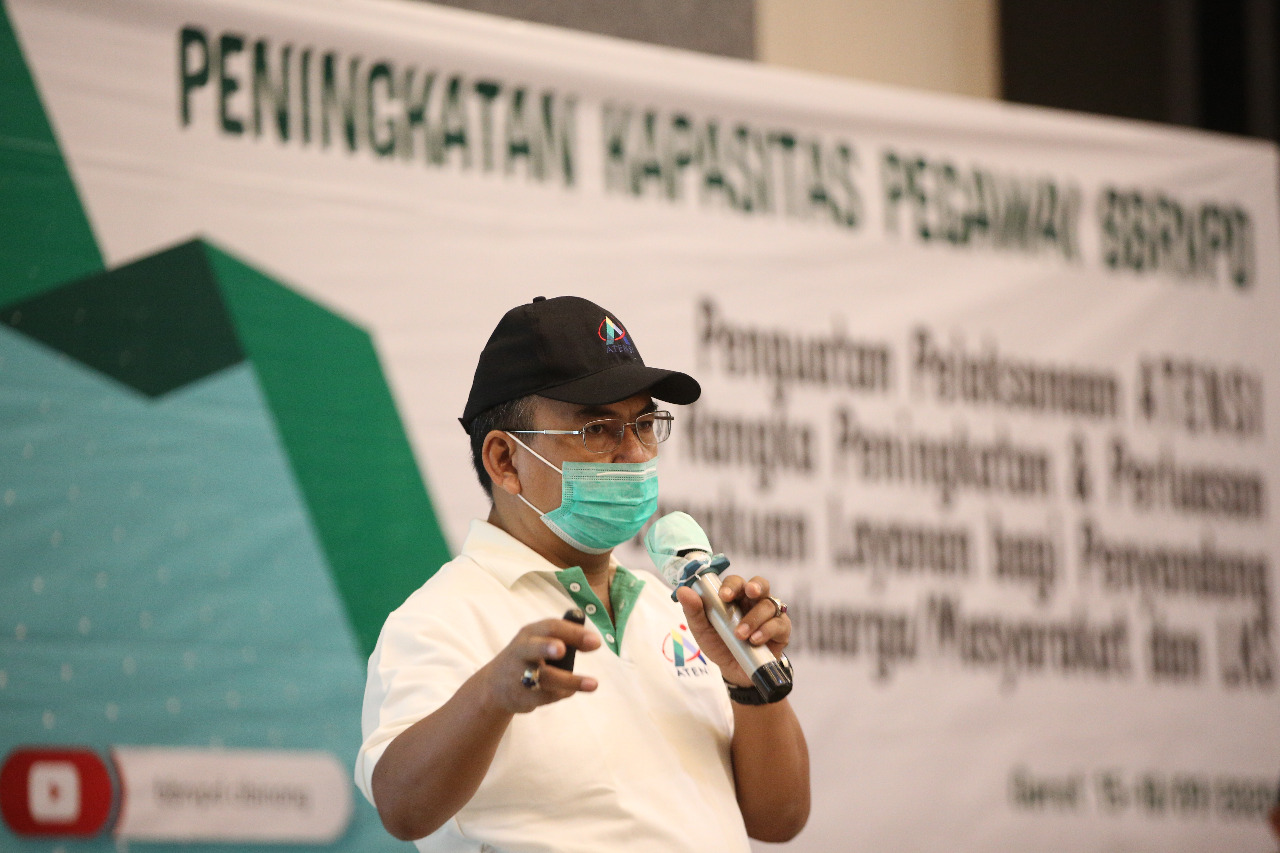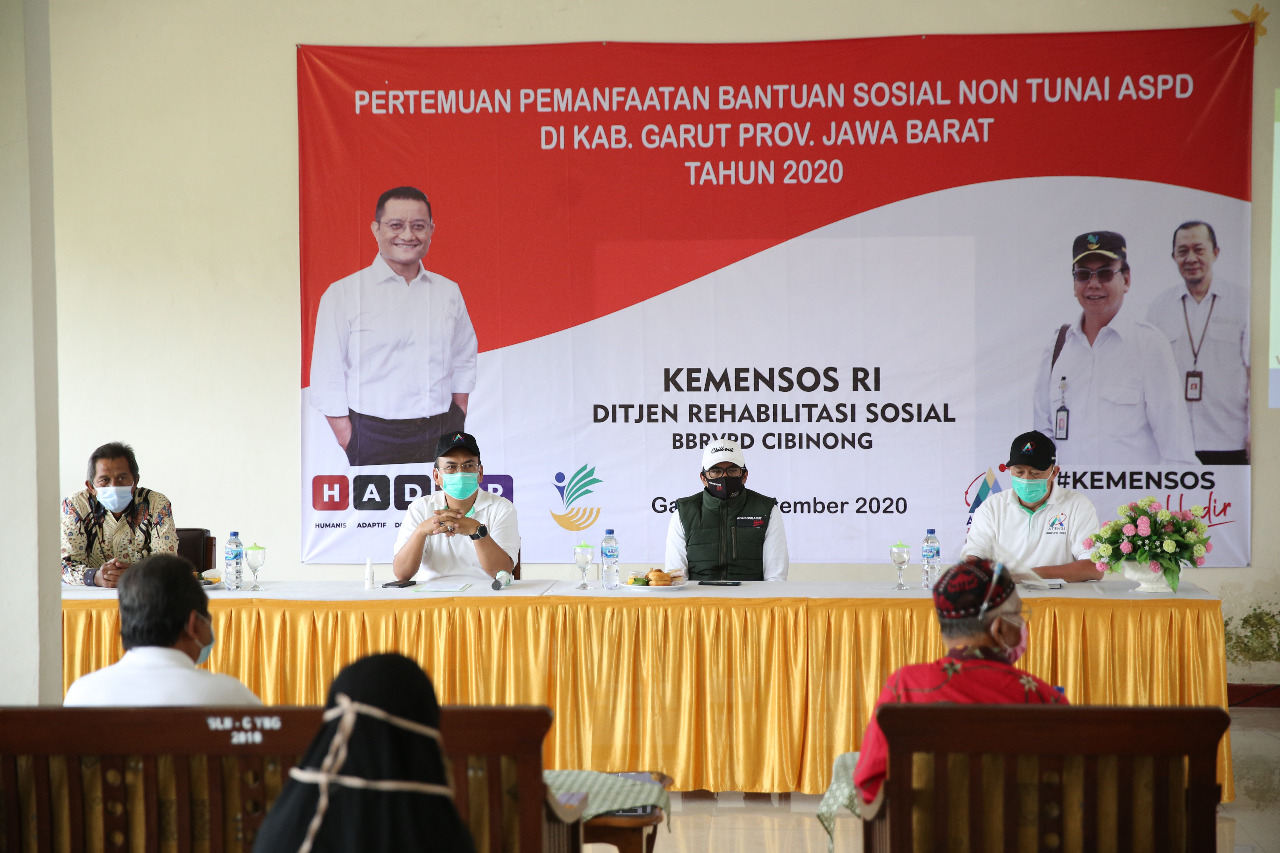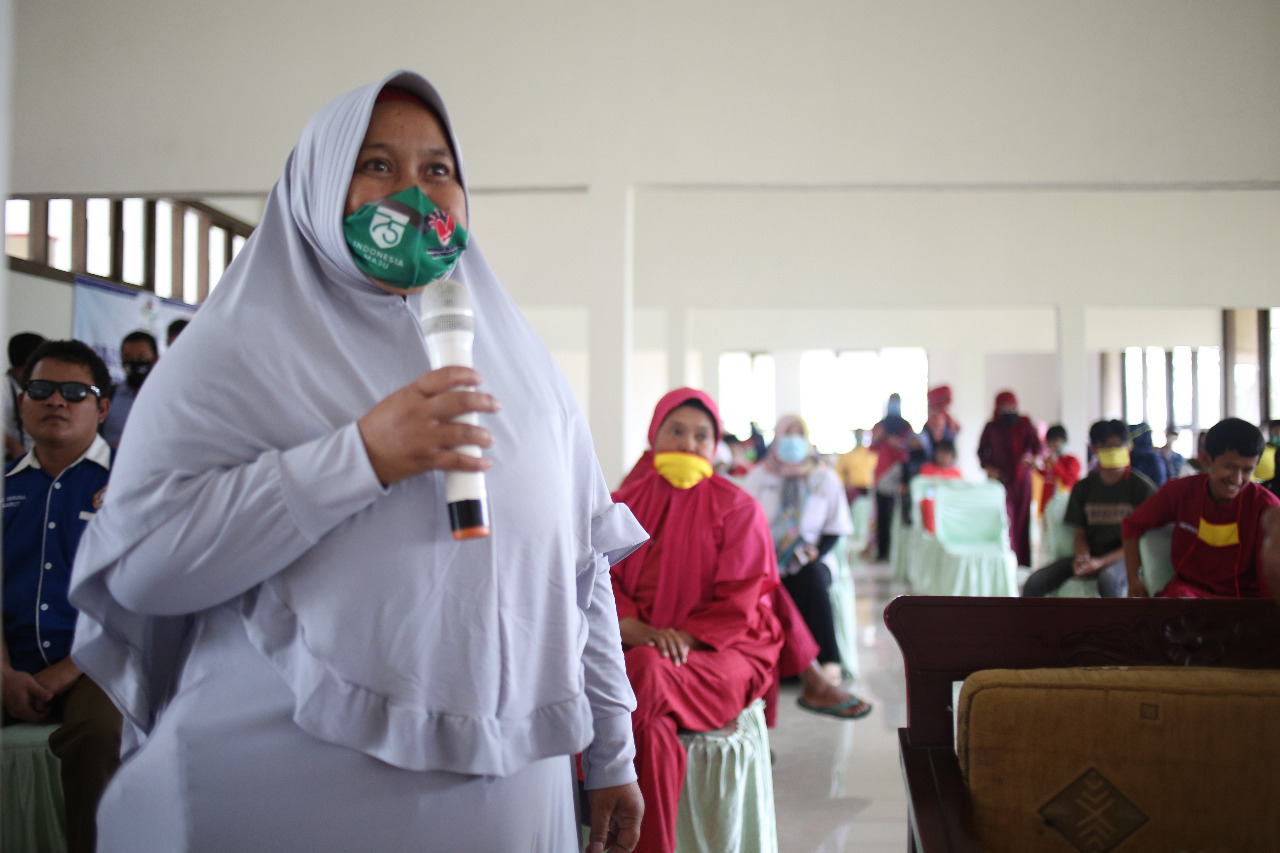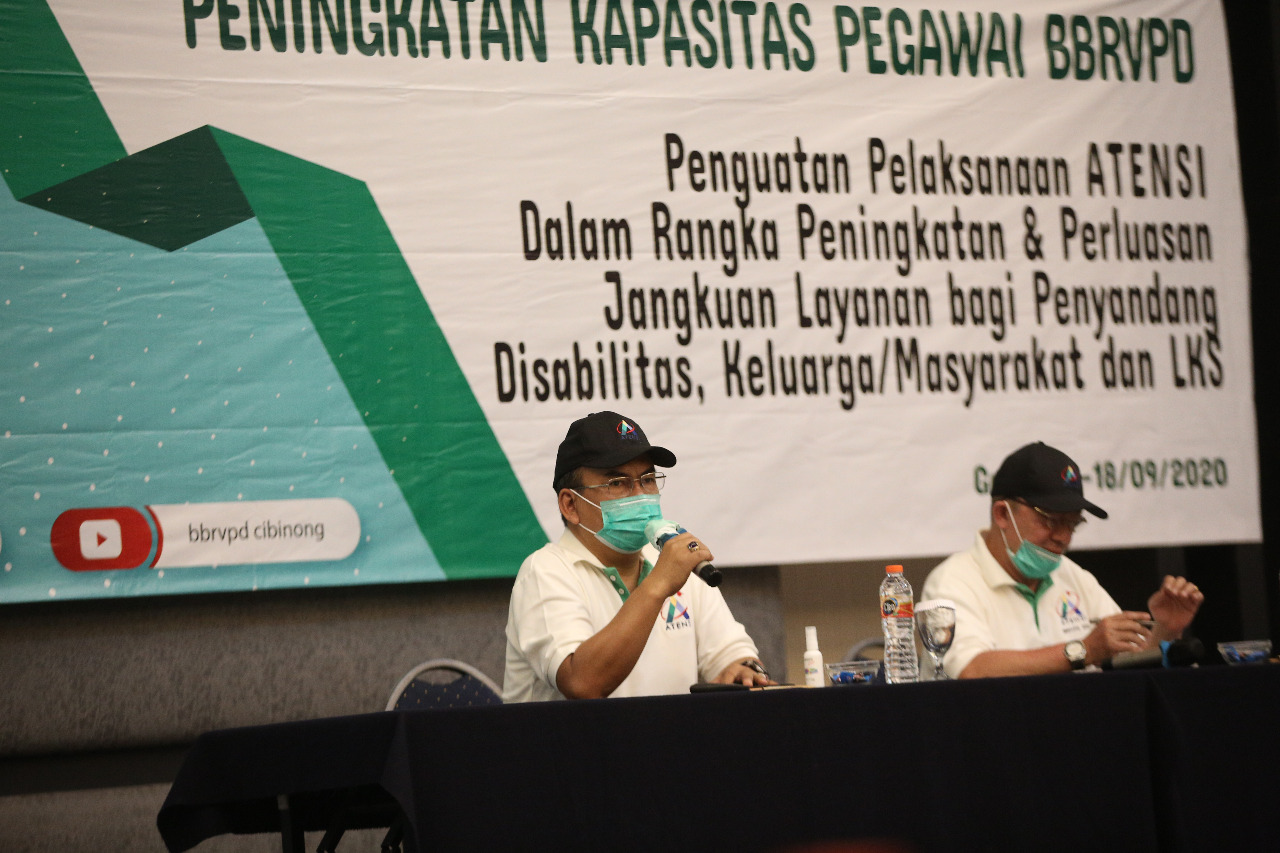GARUT (September 17, 2020) - Director General of Social Rehabilitation of the Ministry of Social Affairs RI Harry Hikmat was a speaker at the Employee Capacity Building Activity of the Vocational Rehabilitation Center for Persons with Disabilities (BBRVPD) Inten Suweno Cibinong entitled Potential of Persons with Disabilities in Entering the World of Work in Garut, West Java.
Harry explained that the activity was to adjust to the direction of the strategic policy and social rehabilitation program. One of them involves the function of the Social Rehabilitation Center as a center for social services for persons with disabilities.
"Of course, adjustments have been made and it is confirmed that it has a strategic position in providing social services. Therefore, the function of the central government (Kemensos) is differentiated through the Technical Directorate with the Technical Implementation Unit (UPT) of the Ministry of Social Affairs," said Harry in Garut, West Java, Thursday (17/9/2020). He added that the Social Rehabilitation Program is under the Directorate General of Social Rehabilitation and is implemented by the UPT.
"This is a service that also has a broader approach, namely a family, community approach that involves LKS and/or residential-based case management. What is the service? With the fulfillment of a decent life, family support, psychological social therapy, social care, skills and entrepreneurship, the improvement of accessibility is all carried out by the center in the future. So that the center will become a disable center, its function is not specific to certain disabilities, "explained Harry.
"In practice, in fact, they are multifunctional but need to be strengthened from a legal aspect. So, there will be a regulation on social rehabilitation assistance that optimizes the functions of the existence of the Center. This is a follow-up to the direction of the Minister of Social Affairs Juliari P Batubara," he continued.
Harry continued, from UPT as service center, referral center, system development center and this will network with Social Welfare institutions, organizations of persons with disabilities, to take real action in the community.
In the event Harry also explained about the entrepreneurial potential for people with disabilities. "This is an issue regarding capability, there is a vocational or skill issue. Capabilities don't mean they can't be inclusive in their daily lives. They only need proper accommodation with assistive devices, so accommodation includes the surrounding environment if they do mobility, make sure that accessibility is available, facilitated a disability-friendly environment. That concerns accommodation. The capabilities concerned can be equipped with aids such as hearing aids, for the deaf, reading glasses, walkers, wheelchairs, learning aids, including mobile audio, speech books for the blind. it's to complement the limitations they have. Each vocation or skill has potential, which we map and identify," said Harry.
According to Harry, this is done through varied trainings that are in accordance with the basic skills of the vocational and their characteristics. Currently, said Harry, quite a lot of people with disabilities are becoming entrepreneurs. Various benefits are obtained, in order to realize an independent and prosperous disability.
"Many, yes. Those who have succeeded in their benefits can decide their disability so they don't feel hampered. He can be inclusive in society, economically he can prosper. He can support himself and they can transmit it. That is the function of the Center to be a testimony or inspiration for people with disabilities who others who have been successful. So, we often hold events and present best practices and successful entrepreneurs, so I really encourage entrepreneurship," he explained.
He also emphasized that Social Rehabilitation is not just a change in behavior, but there must be an increase and utilization of the potential they have, so that for their independence that is through entrepreneurship.
"We should not also produce disability beneficiaries who are ready to become employees, the number is limited from statistical data, those who can access are still not feasible, facilities are inadequate in the company, low HRD commitment. In fact, we can invite them to become entrepreneurs, become independent entrepreneurs and that is possible with attention from assessment to service and after-care entrepreneurship," explained Harry.
The current work that must be done is to prepare persons with disabilities to live independently, including linking with capital sources and marketing media.
"Actually, there are many who care but not all of them are connected. That's why MoUs with companies must be encouraged. So far, there are 97 companies that have partnered with the Ministry of Social Affairs, there are even companies that are waiting for Cibinong Center’s alumni to become workers. it is ready to accommodate and can work immediately. Because Cibinong Center is known for its ability to provide training and is reliable. In the past it worked with JICA, so the equipment is also modern and sophisticated but now needs to be upgraded. What we are currently pioneering is to collaborate again but until now We try to be independent first," said Harry.
During his visit to Garut, Harry also visited LKS Bina Grahita to monitor the use of social assistance for Social Assistance for Persons with Disabilities (ASPD). "I feel proud to be present among all of you. I was given the mandate by the Minister of Social Affairs to see and directly monitor the use of social assistance for the Social Assistance for Persons with Disabilities, which hopefully can be well received and full of responsibility, so that the funds we provide channel it more precisely for use by people with disabilities," said Harry.
Meanwhile, Head of BBRVPD Cibinong Manggana Lubis said, currently BBRVPD Cibinong provides services to people with disabilities as many as 24,226 people, consisting of Vocational Rehabilitation service programs for 526 people with disabilities, and for 23,700 people with disabilities through ASPD cash transfer assistance programs throughout Indonesia, both based on LKS and individuals.
Of the 23,700 recipients of ASPD non-cash social assistance, there were 2 dis, namely wave 1 of 17,532 people with disabilities, consisting of: 12,571 individual recipients, 4,961 recipients through LKS spread across 33 provinces and 340 regencies/cities, each of which received assistance. IDR 2 million per person.
For West Java Province in 2020 there were 1,506 people with disabilities consisting of: individual recipients 977 recipients through LKS 529. "Especially in Garut district in 2020 as many as 89 people with disabilities consisting of: individual recipients 34 people spread over 7 sub-districts (Kec Tarogong Kaler, Tarogong Kidul district, Samarang district, Pasirwangi district, Leles district, Kadunggora district, Singajaya district. The recipients are through LKS 55 people and spread over 3 LKS (LKS Bina Grahita, LKS Yayasan Nur Divinee Assani "LSK Cahaya Al-Furqon Foundation," said Manggana.
On that occasion, Harry also had a dialogue with the parents of one of the Beneficiaries of Persons with Intellectual Disabilities who have slow learning intellectual disabilities. The mother, Sariah, expressed her gratitude for the social assistance because it was used to support her child's therapy equipment.
"Alhamdulillah, I have received Rp. 2 million. The aid is used to support therapy, he is a slow learner. I also set aside his help to buy groceries so that his nutritional needs are fulfilled," said Sariah.
 English
English
 Bahasa
Bahasa




